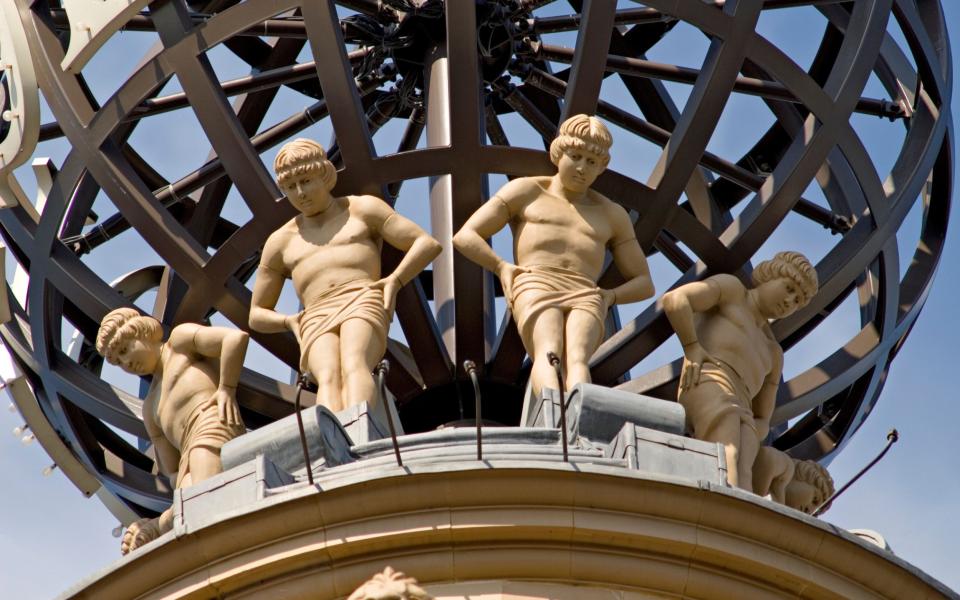Letters: An Israeli perspective on war – and how to achieve a lasting peace

SIR – As an Israeli who moved from Britain, I want to share my view of the current situation here.
One of my children, aged 20, is serving in the army and was called into Kibbutz Be’eri on October 7, witnessing the appalling scenes there.
We have no wish to be at war and want peace with our neighbours. In fact, the last thing we want is to see our children go to war. We pray every day that peace will come to the region.
We are not naive, however. The events of October 7 have revealed the true nature of those who fight with and support Hamas – be they in Gaza or elsewhere in the Middle East, or in the streets and universities of the West.
We need to remain strong, as the Western world needs to remain strong, while doing all we can to minimise the pain being caused by Hamas to both sides, through its terrible actions against Israelis and the use of human shields among its own people.
Ben Lazarus
Yad Binyamin, Israel
SIR – I am appalled by the continued killing of Palestinians, many of them children (“‘Apocalyptic’ situation in Gaza as half of population now starving”, report, December 11), and ashamed that our Government merely abstained when the UN security council tried to vote for a ceasefire.
Hugh Williams
Highworth, Wiltshire
SIR – If the UN wants to stop the suffering of Palestinians, it must persuade Hamas to surrender.
David Walters
Corbridge, Northumberland
SIR – The humanitarian situation in Gaza is dreadful. Most large navies have hospital ships or big vessels – such as aircraft carriers – that can be repurposed quickly to provide succour for those in most need.
It is a failure on the part of our nation and others that this is not being done.
Wing Commander Colin Cummings
Yelvertoft, Northamptonshire
SIR – In your Leading Article (December 10), you state: “All across the Western world, ignorance and anti-Jewish sentiment have gained ground. This is a problem that will get worse unless it is confronted head-on.”
I could not agree more. So when will the Government, the Metropolitan Police and the various city mayors meaningfully tackle it when it appears on our streets? Will it be before it’s too late, or should Jews – increasingly marginalised and afraid – just wait for the apologies and “lessons learnt”.
The so-called pro-Palestinian demonstrations – which our police are too cowed to challenge, and which never call for the Israeli hostages to be released by the Hamas terrorists – are increasingly intimidatory, with their banners and rhetoric defaming Israel and Jews by association, and joyfully threatening their very existence.
Nigel Tobias
Executive director British-Israel Chamber of Commerce
Hale, Cheshire
Sunak and Covid
SIR – Why was the Covid Inquiry wasting time on Rishi Sunak’s Eat Out to Help Out scheme (telegraph.co.uk, December 11)?
Yesterday’s session was just another example of how it has become a blame game – an exercise in Government-bashing that will not help future administrations manage pandemics.
Peter Williman
Chatteris, Cambridgeshire
SIR – To be fair to Mr Sunak, I don’t recall Eat Out to Help Out being compulsory.
Dr Richard A E Grove
Isle of Whithorn, Wigtownshire
SIR – As a solicitor recently working for a major public inquiry, I increasingly despair of the Covid Inquiry.
It is vital that we learn whether non-pharmaceutical interventions worked – in particular, lockdowns. Real-world data emerging suggests that the long-term collateral damage outweighs any short-term benefits.
A useful exercise would be to assess lockdown as a “drug” and ask whether, applying National Institute for Health and Care Excellence criteria of quality-adjusted life years, it would have been approved, given that Covid deaths occurred mostly among the elderly – and the side-effects, in terms of health, society and the economy, are incalculable and potentially catastrophic. The inquiry appears uninterested in such issues, however.
Gary Graves
Richmond, Surrey
Is anyone a doctor?
SIR – You report (December 11) that patients may not know they are being treated by a physician associate rather than a doctor.
Clarity could be improved by dispensing with the term “medic”, which has crept into public discourse. It is a word that we have never defined properly and can be interpreted in several ways. If one means doctor, say “doctor”; if one means otherwise qualified medical practitioners, please be clear about who they are.
David Bennett
Holt, Norfolk
Being served
SIR – In an age when there are many complaints of poor service, I have a compliment.
On December 1 I had my passport photograph taken at a well-known shop. I came home and applied for my new passport online. I posted my old one on December 4, and the new one was delivered on December 9. I had several emails from the Passport Office updating me on my application.
Greig Bannerman
Frant, East Sussex
SIR – Iain Dale is wrong about the value and service of Royal Mail (Comment, December 11). I recently posted a letter at midday from my Somerset village post office and it arrived in Fife, Scotland – more than 700 miles away –at nine o’clock the following morning.
Given that Royal Mail is hamstrung by the outdated Universal Service Obligation to visit over 30 million homes and business addresses six days a week, this was first-class service.
Jonathan Levenson
Minehead, Somerset
Pyjama puzzle
SIR – Having bought my pyjamas from Marks & Spencer for some 50 years, I was startled to find that my latest pair has pockets in the trousers.
What do people put in them?
Bill Welland
Somerton, Somerset
Looking for leadership
SIR – I have voted Conservative for more than 50 years. I now find myself at a loss as to whom to support at the next general election. The Tories are no longer a single party, but a mix of different factions arguing among themselves.
Meanwhile, the Labour Party opposes everything the Government puts forward without offering any credible alternatives.
When will a real leader step forward to put the Great back into Britain?
A J C Gorman
Ickenham, Middlesex
SIR – In its defence of its new immigration proposals, the Government says: “The minimum income requirement ensures that families are self-sufficient instead of relying on public funds.”
Our British son, a teacher of English with over 20 years’ experience, has been planning to return to the UK from Taiwan with his Taiwanese wife and British children. Most British teaching jobs pay less than the proposed threshold of £38,700 a year. Does the Government believe that most British teachers are a burden on the state?
Richard and Judy Deveson
Milton Keynes, Buckinghamshire
Tax on second homes
SIR – Regarding council tax on second homes, the situation in Torbay is worse than you portray (report, December 5).
When a property is empty here and undergoing renovation, full council tax is charged immediately – even when occupation is impossible due to building works. This doubles after two years. Given the high costs of renovation and the stagnant property market, this inflexible policy does nothing to get properties back on the market. It just makes it even more expensive for eventual buyers.
Why not give people renovating property some help instead of just treating them as cash cows? It’s in everybody’s interest to increase the number of homes for sale.
Kate Graeme-Cook
Brixham, Devon
Cut off by BT
SIR – Oliver Dowden, the Deputy Prime Minister, warns the public to stock up on batteries and to have a battery-operated radio and torch in case of power cuts or cyberattacks (report, December 5). Yet he ignores the fact that BT is removing the capacity for our landlines to operate in the event of either scenario occurring.
John Kennedy
Hornchurch, Essex
A reluctant farewell to English National Opera

SIR – Here in the depths of the rural West Country, we are not spoilt with opportunities to see live performances of top-quality opera.
My husband is not very mobile, but English National Opera’s excellent access scheme – and the helpful staff on South Western Railway – made it possible and (just) affordable for the two of us to get to London by rail for a performance – on the last occasion, the wonderful Peter Grimes.
Sadly, with the ENO moving to Manchester (report, December 6), I fear such trips may no longer be possible. Manchester is simply too far away.
Geraldine Wills
Chard, Somerset
National Parks need more funding to flourish
SIR – The Prime Minister talks passionately about how much National Parks mean to him (“Anger at Sycamore Gap felling will be turned into action to renew precious natural world”, Comment, November 29), but he has missed a golden opportunity to give these landscapes the truly transformative powers and investment they desperately need.
After a four-year wait, the Government has published its response to Julian Glover’s Landscapes Review – and it makes for disappointing reading. Despite eye-catching announcements about a new National Park and £15 million of funding for protected landscapes, the review recommended an ambitious package of reforms for restoring nature and improving access – which the Government has largely ignored.
There is clear evidence showing a relentless decline in biodiversity, and the importance of protected landscapes for tackling health and wellbeing crises, but the Government is only providing bitesize remedies. National Parks have suffered a 50 per cent cut in real-terms funding in the past decade, and are having to make agonising decisions, from shutting down visitor services to selling off land and letting nature sites degrade.
Time is running out. Next year will be the 75th anniversary of the creation of National Parks in England. We urgently need a New Deal for National Parks, with more investment and support, so they can flourish for the next 75 years and beyond.
Rose O’Neill
CEO, Campaign for National Parks
London SE1
SIR – It’s good to see artists, poets, painters and photographers protesting the felling of various ancient trees, probably inspired by the vandalism at Sycamore Gap.
It’s a pity they don’t protest about the millions of half-grown trees felled to make way for unreliable wind turbines in Wales’s scenic landscapes.
I Richard
Swansea
Letters to the Editor
We accept letters by email and post. Please include name, address, work and home telephone numbers.
ADDRESS: 111 Buckingham Palace Road, London, SW1W 0DT
EMAIL: dtletters@telegraph.co.uk
FOLLOW: Telegraph Letters on Twitter @LettersDesk
NEWSLETTER: sign up to receive Letters to the Editor here

